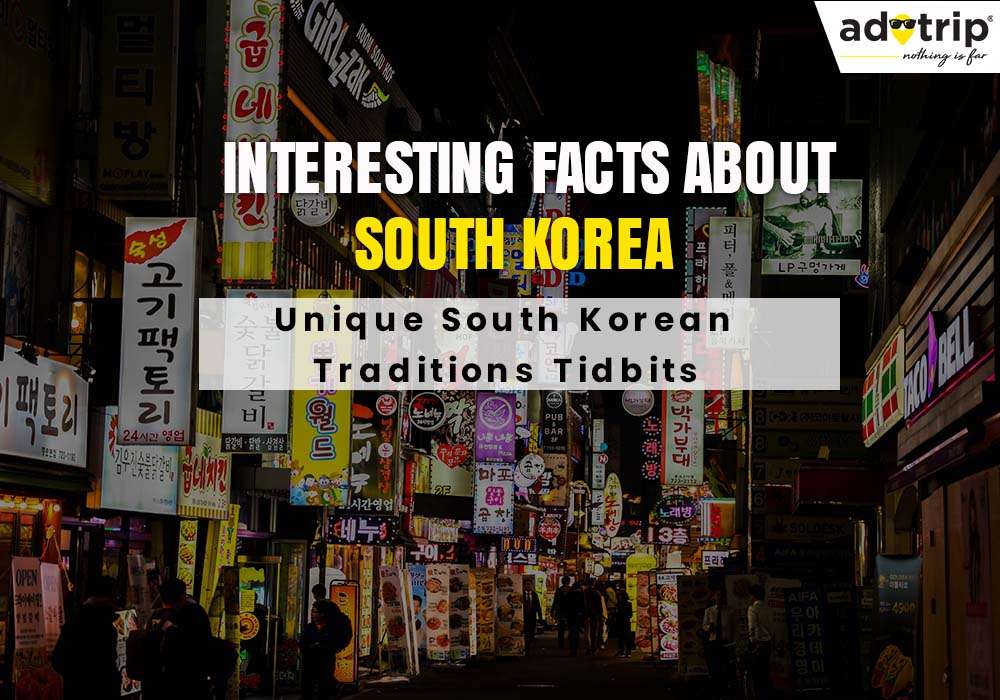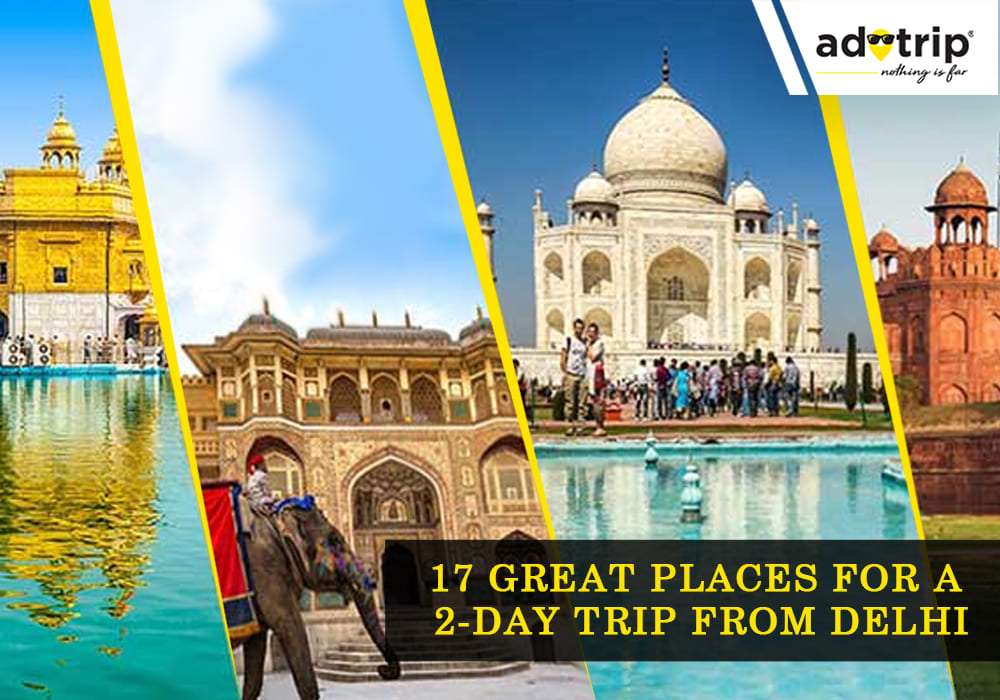
Last Updated At: 26-Feb-2024
14 Interesting Facts About South Korea | You Need To Know In 2024
From its vibrant culture and rich history to its technological advancements, there is much to explore about South Korea. With an average download speed of 171.3 Mbps, web browsing has never been quicker. Additionally, South Korea is well-known for its exceptional education system, consistently ranking high in international assessments. Whether it's the delicious, surprising Korean cuisine, bustling cities like Seoul or Busan, or the breathtaking natural landscapes of Jeju Island, South Korea will captivate your senses and provide unforgettable experiences. Join us as we delve deeper into this mesmerising country and discover more fascinating facts along the way!
List Of Top 14 Facts About South Korea
We'll delve deep into the annals of South Korea's cultural heritage and historical wonders, unearthing some amazing facts that have left an indelible mark on the world stage.
- The Korean Alphabet: Hangul
- Kimchi: A Staple in Korean Cuisine
- The World’s Fastest Internet
- Soju: Korea's Favorite Spirit
- The Highest Number of Plastic Surgeries done in South Korea
- The World’s Most Wired Country
- A Mountainous Wonderland
- Taekwondo: A Martial Art Exported Worldwide
- Unique Holidays: Seollal and Chuseok
- Fanatical Love for Pop Culture – Famous K-pop Artists
- Jjimjilbang: The Korean Spa Experience
- DMZ: A Unique Border
- It is Common to Ask about Blood Type in South Korea
- Tech-savvy Nation
1. The Korean Alphabet: Hangul
South Korea boasts an impressive achievement: it has its own alphabet. Hangul, the Korean writing system, was created in the 15th century under the reign of King Sejong the Great. Hangul is unique in that it was intentionally designed to be easily learnable, and it's regarded as one of the world's most logical and efficient writing systems. While learning a new script may seem daunting, Hangul's simplicity makes it approachable for beginners.
2. Kimchi: A Staple in Korean Cuisine
No exploration of South Korea would be complete without mentioning kimchi. This iconic side dish is made from fermented vegetables, primarily Napa cabbage and Korean radishes, and various seasonings, including chilli pepper, garlic, ginger, and salt. Kimchi is central to Korean cuisine and is consumed at nearly every meal. Its spicy and tangy flavours are delicious and offer numerous health benefits due to the fermentation process.
3. The World's Fastest Internet
South Korea boasts the world's fastest internet speeds, with an average download speed of over 100 Mbps. This remarkable connectivity has driven the nation's technological advancements, making it a global leader in innovation. South Korea's internet infrastructure has paved the way for its dominance in the online gaming industry and the development of cutting-edge technologies like 5G networks.
4. Soju: Korea's Favorite Spirit
Soju is South Korea's national spirit and is a significant part of the country's drinking culture. This clear, colourless alcohol is typically made from rice or sweet potatoes and has a mild, slightly sweet taste. Traditional Korean Festivals have various customs and rituals associated with drinking soju, such as using two hands to pour for elders as a sign of respect. It's also common to enjoy a variety of delicious Korean dishes alongside soju in social gatherings.
5. The Highest Number of Plastic Surgeries done in South Korea
South Korea's advanced medical technology, skilled surgeons, and relatively affordable prices have contributed to the country's status as a global hub for plastic surgery tourism. While some argue that this trend is a form of self-expression and empowerment, others express concerns about its impact on self-esteem and the perpetuation of unrealistic beauty standards. South Korea's high rate of plastic surgeries underscores the complex relationship between beauty, culture, and societal expectations in this technologically advanced nation.
Read More : Tourist Places To Visit In South Korea
6. The World's Most Wired Country
South Korea is often called the world's most wired country, and for good reason. Beyond its fast internet, South Korea has one of the highest smartphone penetration rates globally, and it's common to see people of all ages using their smartphones for everything from shopping to socializing.
7. A Mountainous Wonderland
South Korea's landscape is a breathtaking blend of mountains, forests, and coastlines. The country is approximately 70% mountainous, providing ample hiking and outdoor adventure opportunities. One of the most famous peaks is Seoraksan, known for its stunning scenery and vibrant fall foliage. Nature lovers will find South Korea a paradise waiting to be explored.
8. Taekwondo: A Martial Art Exported Worldwide
Taekwondo, a martial art characterised by its high and fast kicks, originated in Korea. It has gained worldwide recognition and is an Olympic sport today. Taekwondo emphasizes discipline, self-control, and respect, in addition to its physical aspects. Many people worldwide practice Taekwondo not only for self-defense but also for its physical fitness and mental well-being benefits.
9. Unique Holidays: Seollal and Chuseok
South Korea celebrates two major traditional holidays, Seollal (Lunar New Year) and Chuseok (Korean Thanksgiving Day). These holidays are a time for families to come together and pay respects to their ancestors. Traditional customs such as ancestral rites, wearing Hanbok (traditional clothing), and playing traditional games are an integral part of these celebrations. They provide a glimpse into Korea's deep-rooted respect for tradition and family.
10. Fanatical Love for Pop Culture – Famous K-pop Artists
South Korea has taken the world by storm with its pop culture phenomena. K-Pop, short for Korean pop music, has a massive global following. Groups like BTS and BLACKPINK have achieved international superstardom, captivating fans with their music, choreography, and style. Korean dramas, often referred to as K-dramas, have also gained immense popularity worldwide, drawing viewers into captivating storylines and complex characters.
11. Jjimjilbang: The Korean Spa Experience
Jjimjilbangs are Korean bathhouses that offer a unique spa experience. These establishments are open 24/7 and provide many amenities, including saunas, hot baths, relaxation areas, and even sleeping quarters. It's a place where Koreans and tourists alike go to unwind, socialise, and rejuvenate. The experience of spending a night in a jjimjilbang is a must-try for anyone visiting South Korea.
12. DMZ: A Unique Border
The Korean Demilitarized Zone (DMZ) is one of the most heavily fortified borders in the world, separating North and South Korea. While the DMZ symbolises the division of Korea, it has also become a unique ecotourism destination. The area is home to rare flora and fauna due to limited human interference, making it a fascinating place for nature enthusiasts and intriguing Korean history buffs.
13. It is Common to Ask about Blood Type in South Korea
In South Korea, it's common for people to inquire about one another's blood types as a form of social small talk. This practice, known as "blood type personality theory," is deeply ingrained in Korean culture. Many believe a person's blood type can reveal insights into their personality traits, compatibility with others, and even their future destiny. For example, Type A individuals are often seen as organized and diligent, while Type B individuals are considered more creative and free-spirited. While it may seem unusual to some, discussing blood types is a lighthearted and culturally significant way for Koreans to connect and understand each other better.
14. Tech-Savvy Nation
South Korea is undoubtedly one of the most technologically advanced countries in the world. It boasts some of the fastest internet speeds globally, and it's a hub for tech innovation. From the latest smartphones to cutting-edge robotics, South Korea is at the forefront of technological development. Its innovation extends to various industries, including entertainment, automotive, and healthcare.
Read More : Famous Festivals Of South Korea
Are you planning your trip to explore the hidden gems of South Korea?
Adotrip is here to provide you with everything you need to make your trip a memorable and enjoyable experience. From thorough travel supplies to expertly chosen itineraries and local insights, Adotrip has got you covered!
With us, nothing is far!
Book Korea South Tour Packages
FAQs About Facts About South Korea
Ques 1. What is the significance of the Korean alphabet, Hangul?
Ans. The Korean alphabet, Hangul, is a featural writing system that was created in the 15th century by King Sejong the Great. It is considered to be one of the most scientific and efficient writing systems in the world. Hangul is based on the principles of the Korean language, and its letters are designed to be easy to learn and remember. This made it possible for the common people to learn to read and write, which helped to promote literacy in Korea. Hangul is also a very beautiful writing system, and it is often used in art and design.
Ques 2. How did South Korea's "K-pop" music genre become a global phenomenon?
Ans. South Korea's K-pop phenomenon emerged through a combination of factors. A blend of catchy melodies, impressive choreography, and visually appealing music videos captivated global audiences. Aggressive marketing strategies, social media, and fan engagement also played pivotal roles in its international success. Additionally, government support and talent development programs that bolstered the industry's growth, helping K-pop transcend borders and become a global sensation.
Ques 3. What is the DMZ (Demilitarized Zone) and its significance in Korean history?
Ans. The DMZ, or Demilitarized Zone, is a heavily fortified buffer area dividing North and South Korea. It symbolises the division between the two countries after the Korean War (1950-1953). Significantly, it represents the ongoing tension and the hope for eventual reunification.
Ques 4. How did South Korea experience rapid economic growth in the latter half of the 20th century?
Ans. South Korea achieved rapid economic growth in the latter half of the 20th century through strategies like export-oriented industrialisation, investment in education and technology, and government-led initiatives. Companies like Samsung and Hyundai became global leaders, transforming the nation into an economic powerhouse.
Ques 5. What are some traditional Korean dishes and their cultural importance?
Ans. Traditional Korean dishes like kimchi, bulgogi, and bibimbap hold cultural significance. Kimchi represents fermentation expertise, bulgogi showcases Korean barbecue traditions, and bibimbap reflects the harmony of colours and flavours in Korean cuisine, reflecting cultural values of balance and community.
--- Published By Adotrip
Latest Blogs

17 Best Places for 2 Days Trip from Delhi

Top 10 Hill Stations Near Bangalore for an Unforgettable Get...

Top 10 Hill Stations Near Chennai For a Perfect Getaway

10 Best Hill Station Getaways Near Gurgaon for Peace Seekers

10 Astonishing Underwater Temples of India You Must Visit in...
Speak to our experts
Popular Flights
Lucknow to Pune Flights
Coimbatore to Coimbatore Flights
Kochi to Nagpur Flights
Bhubaneswar to Kochi Flights
Bangalore to Jammu Flights
Dehra Dun to Mumbai Flights
Delhi to Jammu Flights
Thiruvananthapuram to Bangalore Flights
Udaipur to Bangalore Flights
Mangalore to Indore Flights





.jpg)
 Dubai
Dubai Malaysia
Malaysia USA
USA






